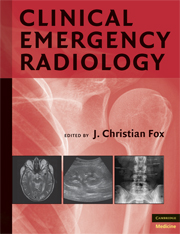Book contents
- Frontmatter
- Contents
- Contributors
- PART I PLAIN RADIOGRAPHY
- 1 Plain Radiography of the Upper Extremity in Adults
- 2 Lower Extremity Plain Radiography
- 3 Chest Radiograph
- 4 Plain Film Evaluation of the Abdomen
- 5 Plain Radiography of the Cervical Spine
- 6 Thoracolumbar Spine and Pelvis Plain Radiography
- 7 Plain Radiography of the Pediatric Extremity
- 8 Plain Radiographs of the Pediatric Chest
- 9 Plain Film Radiographs of the Pediatric Abdomen
- 10 Plain Radiography in Child Abuse
- 11 Plain Radiography in the Elderly
- PART II ULTRASOUND
- PART III COMPUTED TOMOGRAPHY
- PART IV MAGNETIC RESONANCE IMAGING
- Index
- Plate Section
7 - Plain Radiography of the Pediatric Extremity
from PART I - PLAIN RADIOGRAPHY
Published online by Cambridge University Press: 07 December 2009
- Frontmatter
- Contents
- Contributors
- PART I PLAIN RADIOGRAPHY
- 1 Plain Radiography of the Upper Extremity in Adults
- 2 Lower Extremity Plain Radiography
- 3 Chest Radiograph
- 4 Plain Film Evaluation of the Abdomen
- 5 Plain Radiography of the Cervical Spine
- 6 Thoracolumbar Spine and Pelvis Plain Radiography
- 7 Plain Radiography of the Pediatric Extremity
- 8 Plain Radiographs of the Pediatric Chest
- 9 Plain Film Radiographs of the Pediatric Abdomen
- 10 Plain Radiography in Child Abuse
- 11 Plain Radiography in the Elderly
- PART II ULTRASOUND
- PART III COMPUTED TOMOGRAPHY
- PART IV MAGNETIC RESONANCE IMAGING
- Index
- Plate Section
Summary
INDICATIONS
Plain extremity radiographs are indicated in pediatric patients with significant mechanism of injury; pain; limitation of use or motion; or physical exam evidence of deformity, swelling, or tenderness. The joint above and below the site of injury should be carefully examined, and radiographs of adjacent joints should be obtained when indicated. Occasionally, parental pressure to exclude fractures is a contributing factor in determining the need for extremity radiographs.
DIAGNOSTIC CAPABILITIES
Pediatric extremities consist of growing bones and ossifications centers, with wide variability in normal-appearing bones based on age. Despite these variations, a basic understanding of bone development physiology and time of onset of certain radiographic findings, particularly ossification centers of the elbow, is important in order to accurately interpret these films. Physeal injuries, which involve the growth plate, comprise up to one-third of all pediatric fractures. Because the physis itself is radiolucent, physeal fractures are not always evident on initial plain radiographs. Follow-up plain radiographs and, occasionally, imaging with magnetic resonance or nuclear bone scan may be necessary.
Minimum views of the extremity should include anteroposterior (AP) and lateral. Ensure that a true lateral of the elbow is obtained because fat pads may be obscured or distorted with any sort of rotated technique.
Keywords
- Type
- Chapter
- Information
- Clinical Emergency Radiology , pp. 117 - 129Publisher: Cambridge University PressPrint publication year: 2008

